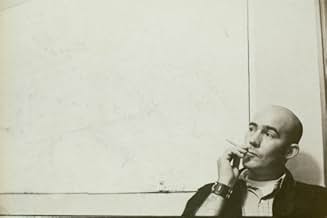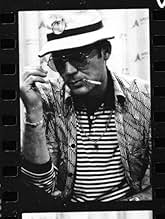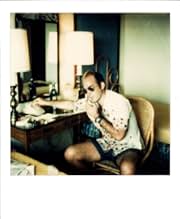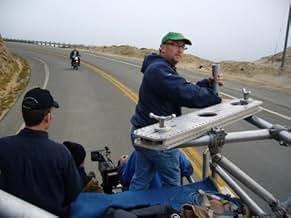IMDb RATING
7.6/10
8.7K
YOUR RATING
A portrait of the late gonzo journalist Hunter S. Thompson.A portrait of the late gonzo journalist Hunter S. Thompson.A portrait of the late gonzo journalist Hunter S. Thompson.
- Awards
- 1 win & 5 nominations total
Hunter S. Thompson
- Self
- (archive footage)
Oscar Acosta
- Self
- (archive footage)
Muhammad Ali
- Self
- (archive footage)
Warren Beatty
- Self
- (archive footage)
- Director
- Writers
- All cast & crew
- Production, box office & more at IMDbPro
Featured reviews
Hunter S. Thompson was a supremely funny man but, alas, was a deeply unhappy one. Thompson's political positions could have hardly been more different from my own. Nevertheless, I admired his work because he was such an original and so entertaining. I did so mainly because I knew better than to ever take him seriously. Unfortunately, Thompson never learned to not take himself too seriously and that failing led to his self destructiveness and, ultimately to his suicide.
Gonzo: The Life and Work of Dr. Hunter S. Thompson is a mostly loving look at Thompson through the eyes of many of his friends and the politicians he wrote about. It shows a man with a profoundly dichotomous nature: creativeness and wit on its positive side but dark, self destructive depression on the other. It created the richly entertaining Gonzo journalist who those of us who admired his work so enjoyed but also planted the seeds for his depression and death.
Near the end of the film, Thompson's first wife, Sondi, takes issue with those who characterize Thompson's suicide as "heroic." I think she has a point. Thompson had largely fallen from the public eye some years before he killed himself in 2005 at the age of 67. In a note delivered to his wife four days before his death, which was described by both his family and the police as a suicide note, Thompson wrote, under the title "Football Season is Over":
"No More Games. No More Bombs. No More Walking. No More Fun. No More Swimming. 67. That is 17 years past 50. 17 more than I needed or wanted. Boring. I am always bitchy. No Fun — for anybody. 67. You are getting Greedy. Act your old age. Relax — This won't hurt."
That about sums it up.
Gonzo: The Life and Work of Dr. Hunter S. Thompson is a mostly loving look at Thompson through the eyes of many of his friends and the politicians he wrote about. It shows a man with a profoundly dichotomous nature: creativeness and wit on its positive side but dark, self destructive depression on the other. It created the richly entertaining Gonzo journalist who those of us who admired his work so enjoyed but also planted the seeds for his depression and death.
Near the end of the film, Thompson's first wife, Sondi, takes issue with those who characterize Thompson's suicide as "heroic." I think she has a point. Thompson had largely fallen from the public eye some years before he killed himself in 2005 at the age of 67. In a note delivered to his wife four days before his death, which was described by both his family and the police as a suicide note, Thompson wrote, under the title "Football Season is Over":
"No More Games. No More Bombs. No More Walking. No More Fun. No More Swimming. 67. That is 17 years past 50. 17 more than I needed or wanted. Boring. I am always bitchy. No Fun — for anybody. 67. You are getting Greedy. Act your old age. Relax — This won't hurt."
That about sums it up.
This is an absorbing doc not only of the good doc but the whole counterculture that he championed in many ways. For all his excessive lifestyle that became almost a parody of the drug culture, he remained a true intellectual and anti-corruption/hypocrisy crusader. He embraced the vision of a new world not ruled by greed and war-mongering, and as early as 1971 proclaimed his great sadness that the movement and the moment of flower power had passed and with it the chance for sane politics. This moment was captured well in "Where the Buffalo Roam" starring Bill Murray as HST, which is given kind of short shrift in this documentary in favor of scenes from "Fear and Loathing Las Vegas" with Johnny Depp as HST. Considering that Depp produced and narrates the film as well as financed the grandiose send-off that Thompson envisioned for himself, it's not strange that Murray's portrayal would be downplayed, as excellent as it was (and Peter Boyle's as the Samoan lawyer.)
All in all, it is a well-balanced account of Thompson's life and work, with many pertinent interviewees like his two wives and son, Jann Wenner of Rolling Stone, Sonny Barger of the Hell's Angels, Jimmy Buffett, George McGovern, Jimmy Carter, Pat Buchanan, Tom Wolfe, and various Aspenites. His passion and wit were undeniable, and his addiction to guns, booze and dope were in many ways forgivable. But his absence in today's disastrous political scene, his voice against war and corruption is sorely missed, and lamented by several of the interviewees. The parallels between Nixon and Bush are easily drawn, and "Gonzo" does this without hammering the point home except to exhort the audience to take up the fight that the Good Doctor waged in a seemingly crazy, but noble and honorable way for most of his life.
All in all, it is a well-balanced account of Thompson's life and work, with many pertinent interviewees like his two wives and son, Jann Wenner of Rolling Stone, Sonny Barger of the Hell's Angels, Jimmy Buffett, George McGovern, Jimmy Carter, Pat Buchanan, Tom Wolfe, and various Aspenites. His passion and wit were undeniable, and his addiction to guns, booze and dope were in many ways forgivable. But his absence in today's disastrous political scene, his voice against war and corruption is sorely missed, and lamented by several of the interviewees. The parallels between Nixon and Bush are easily drawn, and "Gonzo" does this without hammering the point home except to exhort the audience to take up the fight that the Good Doctor waged in a seemingly crazy, but noble and honorable way for most of his life.
Gonzo: The Life and Work of Dr. Hunter S. Thompson: 6 out of 10: Is Hunter S Thompson any more relevant to modern journalism than Joe Namath is to modern football? After all, both were men of their times. In addition, both faded badly by the mid-seventies. Thompson's early work is excellent (a copy of "The Proud Highway" sits on my bookshelf) and reached its pinnacle with Fear and Loathing on the Campaign Trail '72.
A mere three years later Rolling Stone publisher Jenn Warner had become so fed up with Thompson he basically tried to have him killed.
As Gonzo.org puts it "Then, early one evening in March 1975, Hunter was watching a nightmarish film of the evacuation of Da Nang on the evening news. The phone rang, and Hunter picked it up. It was Wenner, saying, "How would you like to go to Vietnam?" Hunter could not resist. The collapse of the American empire was a happening tailor-made for his talents. Within days, he was heading out over the Pacific. He arrived in Saigon hours after Thieu's palace had been bombed and staffed by his own Air Force. For a man who lived with the conviction that the world was going to end next Monday, this was an especially ominous portent. Thompson had the sense of "walking into a death camp." This was it. He would never get out alive. As it turned out, the fate that was in store for him was even worse. Thompson discovered that, even as he was on his way to Vietnam, Wenner had taken him off retainer - in effect, fired him - and with the retainer went his staff benefits, including health and life insurance." Also leaving him no way out of Vietnam... a one-way ticket if you will.
Dude that is cold...
And that is the very nature of the problem with this documentary. Why is not this story mentioned? Who knows? It certainly was a turning point in Thompsons life (He apparently became more withdrawn and paranoid afterwards... understandably so) Gonzo is a pollyanna look at Thompson. The abuse of his first marriage gets a glancing look and all the interviewees (Including Jimmy Carter, Pat Buchanan and Jenn Werner) seem hesitant to speak ill of the dead.
The fact that in a few short years Thompson turned from a well-respected writer into a Muppet and Doonesbury cartoon is not covered well. The fact is mentioned but the reasons are glossed over. It is as if the film is worried that by mentioning his failures it will reduce his significance.
Yet, I would argue that Thompson's effect on Journalism is larger than he gets credit for. Reporters nowadays often ignore facts, concentrating instead on how events make them feel. Anderson Cooper crying during the Hurricane Katrina coverage threatened to become a bigger story than the storm itself. (He was not helped when fellow Mensa candidate Wolf Blitzer said "You simply get chills every time you see these poor individuals…many of these people, almost all of them that we see are so poor and they are so black") The documentary never really focuses on this aspect either. Gonzo seems to fear pulling back any of the masks its subject wears presumably scared of what it might find. Gonzo would have been better served concentrating on one period of time and focusing its energies.
That said, for those unfamiliar with Hunter S Thompson outside of his Muppet form this is a good start. Moreover, if it gets people to read his early work so much the better.
A mere three years later Rolling Stone publisher Jenn Warner had become so fed up with Thompson he basically tried to have him killed.
As Gonzo.org puts it "Then, early one evening in March 1975, Hunter was watching a nightmarish film of the evacuation of Da Nang on the evening news. The phone rang, and Hunter picked it up. It was Wenner, saying, "How would you like to go to Vietnam?" Hunter could not resist. The collapse of the American empire was a happening tailor-made for his talents. Within days, he was heading out over the Pacific. He arrived in Saigon hours after Thieu's palace had been bombed and staffed by his own Air Force. For a man who lived with the conviction that the world was going to end next Monday, this was an especially ominous portent. Thompson had the sense of "walking into a death camp." This was it. He would never get out alive. As it turned out, the fate that was in store for him was even worse. Thompson discovered that, even as he was on his way to Vietnam, Wenner had taken him off retainer - in effect, fired him - and with the retainer went his staff benefits, including health and life insurance." Also leaving him no way out of Vietnam... a one-way ticket if you will.
Dude that is cold...
And that is the very nature of the problem with this documentary. Why is not this story mentioned? Who knows? It certainly was a turning point in Thompsons life (He apparently became more withdrawn and paranoid afterwards... understandably so) Gonzo is a pollyanna look at Thompson. The abuse of his first marriage gets a glancing look and all the interviewees (Including Jimmy Carter, Pat Buchanan and Jenn Werner) seem hesitant to speak ill of the dead.
The fact that in a few short years Thompson turned from a well-respected writer into a Muppet and Doonesbury cartoon is not covered well. The fact is mentioned but the reasons are glossed over. It is as if the film is worried that by mentioning his failures it will reduce his significance.
Yet, I would argue that Thompson's effect on Journalism is larger than he gets credit for. Reporters nowadays often ignore facts, concentrating instead on how events make them feel. Anderson Cooper crying during the Hurricane Katrina coverage threatened to become a bigger story than the storm itself. (He was not helped when fellow Mensa candidate Wolf Blitzer said "You simply get chills every time you see these poor individuals…many of these people, almost all of them that we see are so poor and they are so black") The documentary never really focuses on this aspect either. Gonzo seems to fear pulling back any of the masks its subject wears presumably scared of what it might find. Gonzo would have been better served concentrating on one period of time and focusing its energies.
That said, for those unfamiliar with Hunter S Thompson outside of his Muppet form this is a good start. Moreover, if it gets people to read his early work so much the better.
Greetings again from the darkness. Another excellent documentary from Alex Gibney, who has also blessed us with "Taxi to the Dark Side" and "Enron: The Smartest Guys in the Room". Here, Gibney takes on the fascinating story of Hunter S. Thompson ... he of Gonzo Journalism.
With enough material to support a mini-series, Gibney culls the material down to two hours and provides some insight, but mostly commentary on this uniquely talented writer and observationalist. The highlights include George McGovern heartfelt description of the man and interviews with Thompson's two wives, and "Rolling Stone" editor Jann Wenner. Through their own words and body language, we get a glimpse into the immense respect this man's talent generated. Of course, no punches are pulled on his weaknesses and transgressions.
I couldn't help but chuckle of the irony as Tom Wolfe, resplendent as always in his tailored white suit, explains that Thompson created this character and its uniform/costume and felt the burden of living up to his legendary exploits. He was a captive of his own creation.
While it is difficult to understand how someone with such self-destructive tendencies captured the respect of so many close to him, Thompson is truly an interesting and fascinating topic and was right in the middle of much of the history of the 60's and 70's. Quietly narrated by Thompson's friend, Johnny Depp, the film uses many topical songs selections to accompany moments in time.
With enough material to support a mini-series, Gibney culls the material down to two hours and provides some insight, but mostly commentary on this uniquely talented writer and observationalist. The highlights include George McGovern heartfelt description of the man and interviews with Thompson's two wives, and "Rolling Stone" editor Jann Wenner. Through their own words and body language, we get a glimpse into the immense respect this man's talent generated. Of course, no punches are pulled on his weaknesses and transgressions.
I couldn't help but chuckle of the irony as Tom Wolfe, resplendent as always in his tailored white suit, explains that Thompson created this character and its uniform/costume and felt the burden of living up to his legendary exploits. He was a captive of his own creation.
While it is difficult to understand how someone with such self-destructive tendencies captured the respect of so many close to him, Thompson is truly an interesting and fascinating topic and was right in the middle of much of the history of the 60's and 70's. Quietly narrated by Thompson's friend, Johnny Depp, the film uses many topical songs selections to accompany moments in time.
Let's face it, either you loved or hated the life & words of the late Dr.Hunter S.Thompson,you have to admit...he was a piece of work. This documentary attempts to delve into the life (and head)of Thompson (not always with success,but don't let that throw you). The film (narrated by Johnny Depp,who played Thompson in 'Fear & Loathing In Las Vegas',some years back,making him a natural for the job)delves back to his association with the Hells Angels in the mid 1960's (which ended badly),to his being embraced by the whole Hippie counter culture of the later half of that era (along with massive intakes of various drugs),to writing several novels in the early to mid 1970's,to his subsequent downward spiral (in the creative sense),to his eventual death in 2005,by suicide (and his unorthodox memorial service). Hunter Thompson managed to make a name for himself. What I admired was the fact that it goes out of it's way to prove that the sixties was not always the hippie utopia that the baby boomer's make it out to be. What I could have done without was some of the more forgettable music from the 1960's & 1970's (does anybody really want to hear Jimmy Buffet's 'Margaritaville'for the twenty thousandth time?---I sure as hell don't). Apart from that, 'Gonzo:The Life & Work Of Dr.Hunter S. Thompson' will be a "must see" for those who tend to embrace the counter culture, rather than pop culture/trash culture.
Did you know
- TriviaAt 1:35 you can see a Richard Nixon mask under the TV. This is a nod to the 1980 movie "Where The Buffalo Roam" starring Bill Murray as Thompson, where he uses that mask to train his dog to attack a scarecrow-like recreation of the former President.
- GoofsWhen the film mentions that Hunter Thompson had a crush on Jefferson Airplane singer Grace Slick, archival footage instead shows the Airplane's first female singer, Signe Anderson.
- ConnectionsFeatures To Tell the Truth (1956)
- How long is Gonzo?Powered by Alexa
Details
Box office
- Gross US & Canada
- $1,252,100
- Opening weekend US & Canada
- $191,942
- Jul 6, 2008
- Gross worldwide
- $1,491,958
- Runtime
- 2h(120 min)
- Color
- Sound mix
- Aspect ratio
- 1.85 : 1
Contribute to this page
Suggest an edit or add missing content































